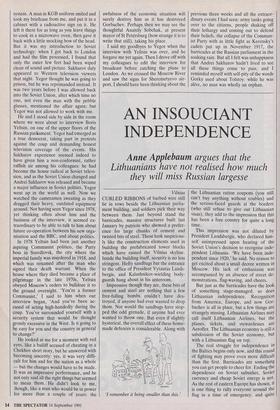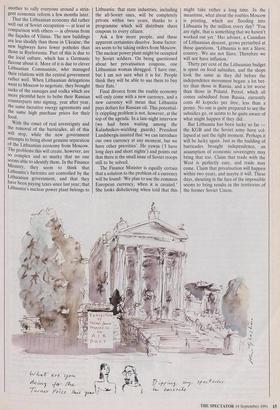AN INSOUCIANT INDEPENDENCE
Anne Applebaum argues that the
Lithuanians have not realised how much they will miss Russian largesse
Vilnius
CURLED RIBBONS of barbed wire still lie in rows beside the Lithuanian parlia- ment building, and soldiers pick their way between them. Just beyond stand the barricades, massive structures built last January by patriots who showed a prefer- ence for large chunks of cement and twisted bits of steel. These look suspicious- ly like the construction elements used in building the prefabricated tower blocks which have ruined the Vilnius skyline. Inside the building itself, security is no less stringent. Hefty sandbags bar the entrance to the office of President Vytautas Lands- bergis, and Kalashnikov-wielding body- guards hang about in his anteroom.
Impressive though they are, these bits of cement and steel are nothing that a few free-falling bombs couldn't have des- troyed, if anyone had ever wanted to drop them. Nor would the sandbags have stop- ped the odd grenade, if anyone had ever wanted to throw one. But even if slightly hysterical, the overall effect of these home- made defences is considerable. Along with
`I remember it being smaller than this.'
the Lithuanian ration coupons (you still can't buy anything without roubles) and the serious-faced guards at the borders (who still refuse to give out Lithuanian visas), they add to the impression that this has been a free country for quite a long time.
This impression was not diluted by President Landsbergis, who declared him- self unimpressed upon hearing of the Soviet Union's decision to recognise inde- pendent Lithuania. 'We have been inde- pendent since 1920,' he said. No reason to get excited about a small decree written in Moscow. His lack of enthusiasm was accompanied by an absence of street de- monstrations, flag-waving, and cheers.
But just as the barricades have the look of something stage-managed, so does Lithuanian independence. Recognition from America, Europe, and now Gor- bachev is all in place, but a few things are strangely missing. Lithuanian Airlines may call itself Lithuanian Airlines, but the planes, tickets, and stewardesses are Aeroflot. The Lithuanian economy is still a subdivision of the Soviet economy, but with a Lithuanian flag on top.
The real struggle for independence in the Baltics begins only now, and this round of fighting may prove even more difficult than the first. Barricades are something you can get people to cheer for. Ending the dependence on Soviet subsidies, Soviet currency and cheap Soviet energy is not. As the rest of eastern Europe has shown, It is one thing to rally everyone around the flag in a time of emergency, and quite another to rally everyone around a strin- gent economic reform a few months later.
That the Lithuanian economy did rather well out of Soviet occupation — at least in comparison with others — is obvious from the façades of Vilnius. The new buildings are less shoddy than those in Ukraine; the new highways have fewer potholes than those in Byelorussia. Part of this is due to the local culture, which has a Germanic flavour about it. More of it is due to clever Lithuanian Communists, who managed their relations with the central government rather well. When Lithuanian delegations went to Moscow to negotiate, they brought sacks of the sausages and vodka which are more plentiful here to bribe their Russian counterparts into signing, year after year, the same lucrative energy agreements and the same high purchase prices for their food.
With the onset of real sovereignty and the removal of the barricades, all of this will stop, while the new government attempts to bring about genuine separation of the Lithuanian economy from Moscow. The problems this will create, however, are so complex and so murky that no one seems able to identify them. In the Finance Ministry, they seem to think that Lithuania's factories are controlled by the Lithuanian government, and that they have been paying taxes since last year; that Lithuania's nuclear power plant belongs to Lithuania; that state industries, including the all-Soviet ones, will be completely private within two years, thanks to a programme which will distribute share coupons to every citizen.
Ask a few more people, and these apparent certainties dissolve. Some factor- ies seem to be taking orders from Moscow. The nuclear power plant might be occupied by Soviet soldiers. On being questioned about her privatisation coupons, one Lithuanian woman shrugged. 'I have one, but I am not sure what it is for. People think they will be able to use them to buy their flats.'
Final divorce from the rouble economy will only come with a new currency, and a new currency will mean that Lithuania pays dollars for Russian oil. This potential- ly crippling problem is not, however, at the top of the agenda. In a late-night interview (we had been waiting among the Kalashnikov-wielding guards) President Landsbergis insisted that 'we can introduce our own currency at any moment, but we have other priorities'. He yawns CI have long days and short nights') and points out that there is the small issue of Soviet troops still to be solved.
The Finance Minister is equally certain that a solution to the problem of a currency will be found: 'We plan to use the common European currency, when it is created.' She looks disbelieving when told that this might take rather a long time. In the meantime, what about the roubles Moscow is printing, which are flooding into Lithuania by the million every day? 'You are right, that is something that we haven't worked out yet.' Her adviser, a Canadian of Lithuanian descent, grows perturbed at these questions. 'Lithuania is not a Slavic. country. We are not Slays. Therefore we will not have inflation.'
Thirty per cent of the Lithuanian budget is spent on food subsidies, and the shops look the same as they did before the independence movement began: a lot bet- ter than those in Russia, and a lot worse than those in Poland. Petrol, which all comes subsidised from Russia, currently costs 40 kopecks per litre, less than a penny. No one is quite prepared to see the subsidies go, or seems to be quite aware of what might happen if they did.
But Lithuania has been lucky so far the KGB and the Soviet army have col- lapsed at just the right moment. Perhaps it will be lucky again. Just as the building of barricades brought independence, an assumption of economic sovereignty may bring that too. Claim that trade with the West is perfectly easy, and trade may come. Claim that privatisation will happen within two years, and maybe it will. These days, shouting in the face of the impossible seems to bring results in the territories of the former Soviet Union.



















































 Previous page
Previous page